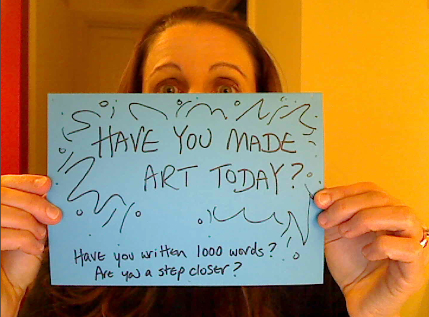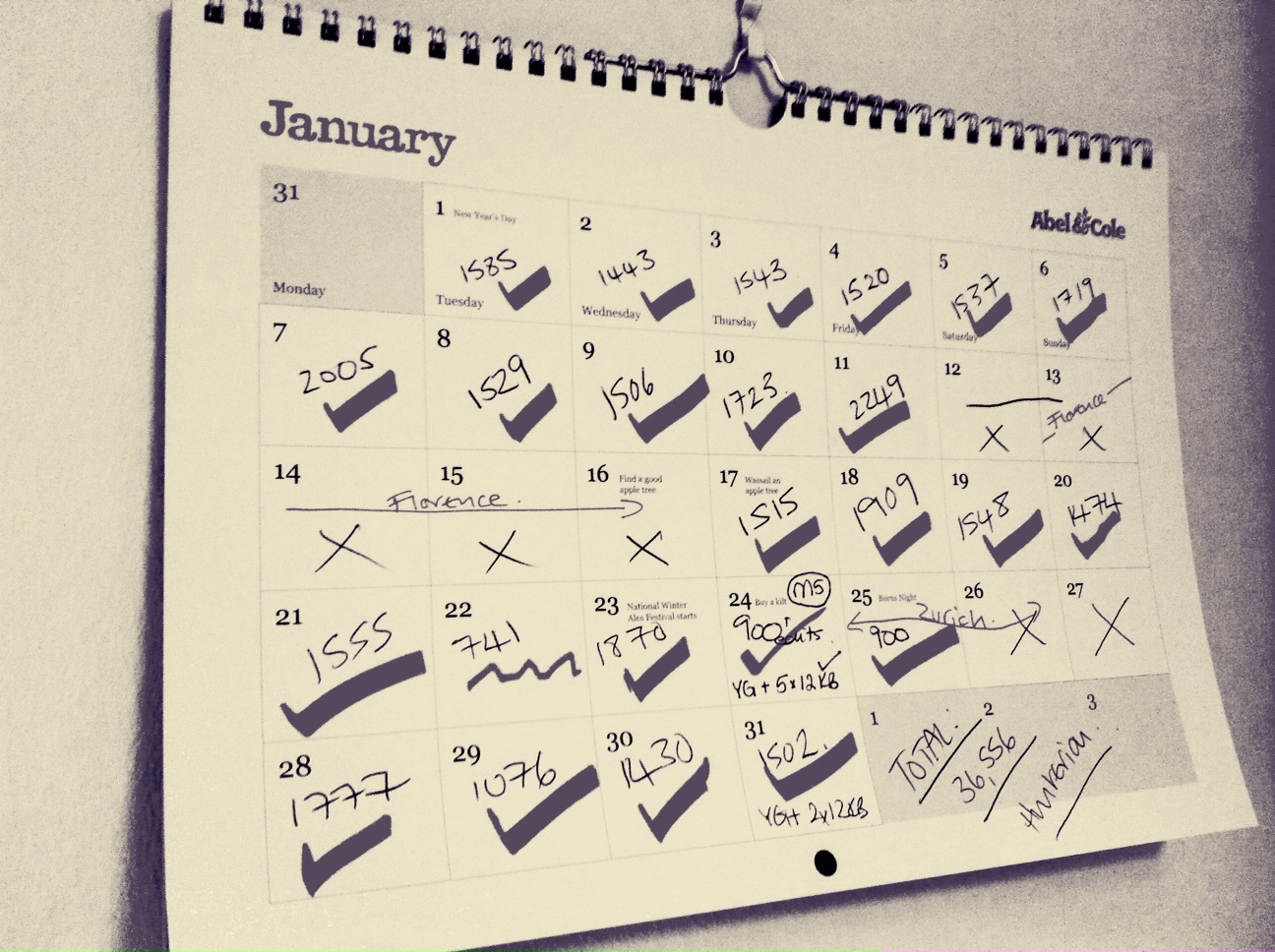OLD POST ALERT! This is an older post and although you might find some useful tips, any technical or publishing information is likely to be out of date. Please click on Start Here on the menu bar above to find links to my most useful articles, videos and podcast. Thanks and happy writing! – Joanna Penn
In the last 3 years, I've written 3 novels. On one hand, this is fantastic and I am celebrating my achievements. But on the other hand, it just isn't good enough if I want to make it as a successful fiction author.

Before you all start shouting, check out this post on the myth that writing fast means skimping on quality.
Also consider the list of the most prolific authors. Isaac Asimov wrote over 500 books in his life, Enid Blyton 600+. I'd better get cracking if I want to join them 🙂
Now watch the video below, or here on YouTube, about how I have increased my writing output.
In the video I discuss:
- How I’ve always been more of a binge writer, prefering batches of bigger word count and days set aside for fiction and other days for marketing, speaking and the rest of the entrepreneurial stuff. But this doesn't cut it if I want to focus on fiction as my primary income (it's about 50% right now and I am NOT earning like Nora!)
- It’s important to learn from the pros who are actually doing this, so when I read a post by Dean Wesley Smith on production schedules, I listened up! Dean and his wife, author Kris Rusch have some fantastic advices on their sites so I absolutely recommend you go check them out.
- Basically you need to decide how much you want to write e.g. 3 x 80,000 word books in a year = 240,000 words . Obviously there’s an editing cycle but the first thing is to get the rough draft done and Dean advocates a regular amount of new fiction writing in order to meet production schedules – so to meet that, I need to write ~666 words per day, every day of the year. That’s not actually too much as it takes me about 30-45 mins to write 500 words (if I know what I want to write about).
- Then decide how you will accomplish that word count e.g. weekly or daily goals. I decided to break out of binge writing and make writing a daily habit, and through that to up my monthly output of words. But I have never managed this – until now!
See my behavioral chart for January 2013 right. It works! It's like the star chart you do for your kids to modify behaviour and adults can use it too! I only missed a couple of days due to traveling and being ‘present' with my husband on a trip to Italy and then speaking in Zurich. But I want that pink tick every day and I want to see the word count and I want it to be at least 1000 words per day. In January I wrote 36,556 words on Hunterian, my current WIP, the best writing month I have ever had. So watch this space for whether I can keep it going all year!
- Yes, it is really hard every day to get this done and I don’t think writing gets any easier, but I definitely feel the need to do it every day now. I also have a sign by my desk “Have you made art today?” which challenges me. Read The Icarus Deception by Seth Godin and you will get your ass kicked too! Stop watching TV and write something!
Do you write every day? Or do you have weekly writing goals? What kinds of writing habits do you have? Please do share your thoughts in the comments below.



I’ve been using a free iphone app called Lift to track how many words a day I’m writing. It has helped me stay on track!
Good advice, Joanna … I can provide a testimonial … that is how I approached my last book, Headwind … knocking out just 500-1000 words a day, I completed the bulk of it in around 6 months. I’ve been slack lately, however , your post provided some inspiration to get back to it. Best of luck to you.
Hello Joanne
A great post – thank you. I have referred to your post on my blog so others can benefit from this.
Here is the link:
http://kindlesphere.com/how-to-write-more/
Liam
I’m truly enjoying the design and layout of your site. It’s a very easy on the eyes which makes it much more pleasant for me to come here and visit more often. Did you hire out a developer to create your theme? Great work!|
Fantastic info! It is indeed a struggle to meet writing goals at times, and I think these practices you mention will be very useful to that end. Thanks for sharing.
Gosh. THANK YOU. I really needed this. Suddenly, I feel this surge of hope that I can actually be a real, actual, published, paying-the-bills-that-way writer.
But––many of Asmiov’s books were mediocre or even bad, and MOST of Enid Blyton’s books were pretty bad. So were most of Agatha Christie’s.
Yeah, they probably should have just given up. /sarcasm
I believe that “bad” and “good” are entirely in the minds of the reader.
60million people bought 50 Shades of Grey and it has tons of raving fans and reviews – does that make it bad or good?
A couple of thousand people bought the latest Pulitzer prize winning book and there are barely any raving fans and very few reviews. Does that make it bad or good?
I love action movies with explosions and fast paced thriller novels that take me out of the world for a time. I don’t want to think when I experience them. Does that make them bad or good, or me shallow?
Luckily we now live in a world where readers get to decide what they want, rather than the gatekeepers forcing it down their throats.
End Blyton was the backdrop of my childhood – I devoured many of her books and loved them. Agatha Christie changed the mystery genre. And Asimov will certainly be remembered for far longer than you or I.
I’m going to keep writing.
Well said Joanna!
I LOVE reading literature – it is what takes me out of the world and gets me thinking about other people’s ideas rather than being wrapped up in my own.
Genre fiction is not as much of a pull for me (though I have enjoyed the books of yours I have read 🙂 ), and I still absolutely agree with you.
Of course it does not make you shallow to like explosions and adventure, any more than it would make you shallow to choose a yellow shirt over a blue one. There is a nutty tendency among readers and writers to want to categorize and judge, but the fact is that kind of attitude only stands in the way of art being made.
Five hundred books is impressive no matter what. At the end of a life, it is going to be the things you put out that survive you, not that one perfectly crafted story that took you a lifetime of revision and self-judgement to get just so and that you never deemed good enough.
Both the Pulitzer prize winners and the people’s choice bestsellers are fantastic. We need them all.
Keep writing indeed!
I have lacked the commitment to set a goal and write a certain amount everyday. I had originally set that I would at least write everyday for at least an hour. It just doesn’t happen. I’m even scared to indicate a set number of words each day, but I’m going to going to set a goal (possibly a bit small) and see how that works for me for a month. Then I’ll increase it the next month and so forth.
Reading (and listening to!) posts like this are very motivating. Thanks for sharing the information, tips and resources.
I hang my head in shame because I have not completely accomplished what I said in this comment almost a year ago! (I didn’t even know I read this, let alone commented!) If I had committed like I said I would have more than likely finished by book by December, which was the plan and be editing or promoting, etc. now. Finishing last December was pretty important because I’ve had a medical relapse and seldom fine the spirit, desire, energy, etc., to write something specific. I’m sorta just letting the thoughts flow.
It’s a good thing I read this again. Once my treatment is over, I have plans to do several things that I’ve put off for one reason or another. Fighting a disease that could be fatal has shown a new light on what I do. I don’t want to leave this world without having accomplished a dream I’ve had all of my life.
Thanks for the motivation… again!
I prefer the project goal, like writing one scene a day, and then totaling up the word count at the end of the week and going, “Wow! You’ve written a lot!” I’ve actually always despised word count goals. It’s to easy to write for the sake of the word count goal and not have good material. A scene goal takes that away because the scene can be 800 words of 1500 words, and the story is still getting done. Plus, I also have a very bad history when it comes to word counts. I’ve historically tended to run too short (I understand why now and am working on that), so it’s terribly demoralizing to watch a lack of a word count and feel like no progress is being made.